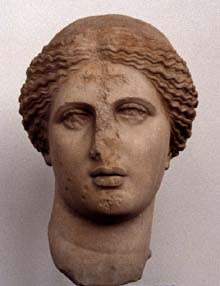Notes:
1.26: Of the fact that idolatry has been subverted by the
name of Christ, and by the faith of Christians, according to the prophets.
Augustine argues that the Christian stance against pagan
idolatry was not a new teaching but one that is found in the Old Testament prophets.
This Old Testament teaching has been preserved by the Jews, even though they
reject Christianity. “Thus,” says Augustine, “the enemy of our faith has been
made a witness to our truth.”
The “demolition” of the polytheistic pagan system has come
from the God of Israel himself. To prove his point Augustine cites the Shema
of Deuteronomy 6:4 and the second commandment against graven images (Exodus
20:4). He further notes that the Christian movement fulfills the promise to
Abraham in Genesis 12, that through him and his seed the nations would be blessed.
Christ’s virgin birth also fulfilled the prophecy of Isaiah 7:14. The God of
the Bible has ordained the overthrow of pagan “superstitions” through Christ.
1.27: An argument urging it upon the remnant of idolaters
that they should at length become servants of this true God, who everywhere is
subverting idols.
Augustine notes again that the teaching against idolatry is found
not only in the books of Christians (the NT) but also in those of the Jews (the
OT). He further asks those pagan who have suggested that the Christian God is
really Saturn, why, then, they do not worship him. Why also do they not accept
his teaching that no other gods are to be worshipped? Augustine also chides the
pagans for worshipping their gods in secret for fear that the Christians will
take their idols and break them to pieces. He closes by suggesting that the
triumph of Christianity over paganism is a fulfillment of Psalm 72:14 that all
nations would serve the God of Scripture.
Conclusion:
Augustine continues his relentless attack on paganism. Christian
teachings on this topic are not new, but they are found in the Old Testament
prophets. Augustine presumes that Christianity has, in fact, already triumphed
over pagan idolatry.

No comments:
Post a Comment